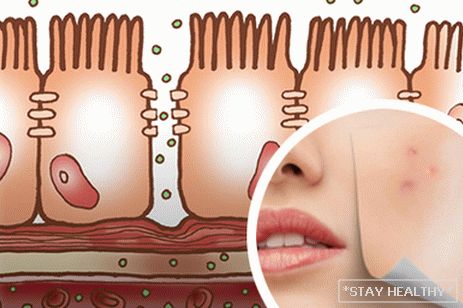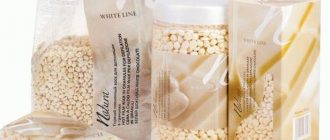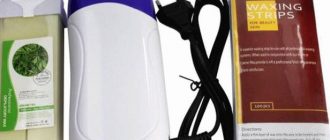We ate some junk food – and suddenly, for no reason, no reason went
minor troubles. On лице обострилось акне (прыщи), появились
rash. Common situation?
Doctors send to check the gastrointestinal tract, but all
tests persistently show normal, and ointment prescribed by a dermatologist
have a weak and temporary effect. What could be wrong?
 Western medicine on the sly
Western medicine on the sly
starts to open the curtain. Many are currently installed
mechanisms of poor performance of the digestive system. For example, good
studied gluten intolerance. Sometimes only the weak link is known
but the exact reason escapes the attention of researchers. therefore
local doctors put into their vocabulary the expression “syndrome
leaky intestine “or scientific terms – increased syndrome
intestinal permeability.
Contents
Leaky gut
Onш кишечный тракт — вовсе не стальная трубка с плотными
walls. It is more like a fine-meshed mesh, the holes of which
so small (less than one nanometer) that the “bad” molecules from
food is simply not able to squeeze them.
Normally, all bad things usually come out naturally
along with leftover food. But sometimes for various reasons, intestines
становится более проницаемым, и тогда токсины, аллергены, а also
pathogens easily overcome the barrier and
absorbed from the intestine into the blood. Next, start the immune
mechanisms that may cause skin rash –
acne.
What leads to increased intestinal permeability?
First, a person may initially inherit from his
родителей «неправильные гены» слабого intestine. Secondly, in
As the root cause, scientists point to insufficient
secretion of gastric juice. This condition can be like
congenital (inherited) and acquired. Plain
laboratory analysis can confirm the guess of the doctor. Fine
hydrochloric acid, and this is the main component of gastric juice, kills
most bacteria. When it is missing, microorganisms settle
on the walls of the intestine and increase its permeability.
Third, prolonged inflammation in the intestinal wall (for example,
with celiac intolerance) can cause her swelling and increase
�”porosity”.
Certain factors may serve as triggering factors.
food (food intolerance), pathogenic
microorganisms, fungi and parasites.
Often a poorly chosen diet causes intestinal cramps,
which we may not even feel at all. However, due to
high pressure walls stretch, and this leads to
an increase in pore diameter and permeability.
Следует also знать, что наша печень отвечает за обезвреживание
all toxins in the body. When the work of this body is broken,
for example, after Botkin’s illness, some of the bad molecules
with the blood stream gets back into the intestinal wall and again –
increases its permeability. It turns out some kind of vicious vicious
a circle.
So, how can you minimize the consequences of a “leaky”
intestines?
First of all, you should choose a diet based on your
food allergens. The fact is that almost everyone has
intolerance to certain types of products.
Another thing that rarely when a person knows about it. Even if you
just watch the character of your chair after drinking
major food allergens (milk, fish, eggs, cereals, citrus,
yeast) then forgive the pun, it will provide good food for
reflections. In case of intolerance of the product, the stool becomes more
liquid, up to the state of water.
In addition, some laboratories offer an analysis on
food allergy (ELISA test). In any case, you will be useful.
know your “enemies” in the face to reduce the load on the digestive tract.
With a weak intestine, the power system should be directed to
prevention of bloating and cramps, but this is a topic for a separate
talk. In short: Avoid frequent use of nuts, cabbage,
seeds, honey, yeast, oats and legumes – they can cause
swelling.
How is intestinal permeability treated
For the treatment of intestinal permeability syndrome on
West for a long time and successfully applied a number of food additives. let’s
let’s analyze what is available on the market right now and what is expected
effect from the reception.
1. Пробиотики Fine хорошие микроорганизмы противостоят в
the intestines are bad and inhibit the growth of the latter. However, long-term use
antibiotics, hormonal drugs, unbalanced nutrition
may adversely affect the beneficial intestinal flora. And then how
Probiotics that help good
microbes to restore their strength and overcome harmful aliens.
Why do you need it? When good bacteria are not enough, pathogens
microorganisms trigger chronic inflammation of the wall, and it
свою очередь вызывает отёк и увеличивает �”porosity”. Give
probiotic – good bacteria multiply vigorously and inhibit growth
bad ones.
2. L-Glutamine (L-Glutamine) Glutamine Amino Acid
restores damaged cells of the intestinal wall, and also
strengthens the general and local (in
3. Enzyme preparations Danae herbal supplement
enzymes provides more complete digestion and assimilation of food,
so that there are no large molecules in the digestive tract
undigested food. So we warn and intestinal
cramps.
4. Betaine Salt Acid Supplement covers salt deficiency
acid, which is necessary for the digestion and disinfection of food.
There is a simple home test to see if you need this.
additive. Start the meal, and when two thirds of
take a pill (650 mg) of hydrochloric acid. If in
subsequently feel heartburn in the upper abdomen, then you
Enough own hydrochloric acid. If you have a burning sensation
experienced, then you are shown taking this supplement.
5. Slippery Elm Additive promotes healing of the walls.
intestine. It contains mucus that is needed for protection.
cells from the action of aggressive factors.
6. Deglycyrrhizin licorice. This plant is used more
three thousand years in the treatment of problems of the gastrointestinal tract.
Licorice stimulates the restoration of the gastric mucosa and
intestine. The term “deglitsirrizirovannaya” refers to technology –
during production, the substance glycyrrhizin is removed, which
increases blood pressure in some people.
7. Althea Root As well as licorice, Althea reduces inflammation in
слизистой оболочке intestine.
8. Caprylic acid Caprylic acid, which is octane,
inhibits the growth of pathogenic microorganisms and fungi. Extreme
more effective with excessive growth of fungi of the genus Candida (Candida). On
the additive does not affect the beneficial microflora.
In addition, be sure to consume enough fiber, watch out
for “regularity.” The longer the constipation lasts, the more toxins
absorbed into the blood. And then you know – problem skin.






